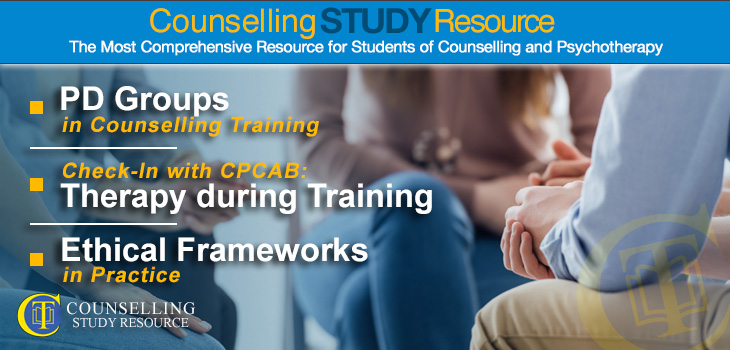131 – Personal Development Groups in Counselling Training
Personal Therapy during Training – Ethical Frameworks in Practice
In episode 131 of the Counselling Tutor Podcast, Ken Kelly and Rory Lees-Oakes discuss personal development (PD) groups in counselling training. ‘Check-In with CPCAB’ then looks at the importance and value of personal therapy during counselling training. Finally, the presenters talk about ethical frameworks in practice, and their use in resolving any ethical dilemmas.
Personal Development Groups in Counselling Training (starts at 2.05 mins)
Personal development or PD groups (also referred to as process groups) typically comprise of five to eight participants. They are a standard part of counselling training courses, especially at higher levels.
In personal development groups in counselling training, it is usual to sit in a circle, with a tutor as facilitator. People may bring any reflections on issues that are currently affecting them on the course or in life more widely.
It is important to note, however, that personal development groups in counselling training are not a personal therapy group.
Being part of a PD group is a unique and magical experience, which – though sometimes uncomfortable and requiring us to practise courage – offers a hugely valuable opportunity to understand how we affect and are affected by others.
Why not come along to the Counselling Tutor Facebook page and share your experiences of and questions about personal development groups in counselling training?
Check-In with CPCAB: Personal Therapy during Training (starts at 10.35 mins)
Rory speaks to Kelly Budd (Head of Qualifications) at CPCAB (Counselling & Psychotherapy Central Awarding Body) about the requirement for personal therapy during counselling training.
Kelly explains that it’s really important for counselling students to know how it feels to experience counselling as a client.
Moreover, counselling training is a time of much personal change, growing awareness and often challenge to existing ways of being and relationships. Even if you have had personal counselling in the past, there are likely to be many new issues to process at this time.
It makes sense to choose a personal counsellor who practises the modality that you are training in – this is often a requirement of course providers.
Experiencing how it feels to be on the receiving end of this, and to know first-hand its effectiveness, is very important to building your trust in the theoretical orientation you are studying.
CPCAB requires all students on its Level 4 diploma to have a minimum of ten hours’ personal counselling during the course, but individual course providers are at liberty to set a higher minimum if they so choose. They may also specify a required split between the two years of study.
Course providers should inform applicants from the start about their requirements for personal therapy, with an approximate cost (so that potential students can budget accordingly).
Kelly suggests that students ‘shop around’ for the counsellor that best fits them, remembering that the cheapest may not be the right therapist for you – so within budgetary constraints, do be as flexible as you can on this, to ensure you maximise your experience of personal counselling.
Some course providers have a list of suggested local therapists, some of whom may be willing to offer a discount for students.
For more information about CPCAB, please see its website. CPCAB is the UK’s only awarding body run by counsellors for counsellors.
Ethical Frameworks in Practice (starts at 26.10 mins)
Ken and Rory discuss the importance and value of ethical frameworks –which all counsellors (qualified and in training) should weave into their practice and supervision.
Ethical frameworks are living documents that the relevant professional body is continually reviewing and updating.
For example, the Brutish Association for Counselling and Psychotherapy (BACP) republished its Ethical Framework for the Counselling Professions in 2018.
When you experience an ethical dilemma in your practice, looking at your ethical framework is a good first step in working out the best way forward.
Ethical frameworks are also used by professional bodies if clients ever make a complaint against a counsellor.
As a clinical supervisor himself, Rory points his supervisees to his Ethical Problem Solving Matrix. Just click here to get your copy.
You can use this to identify robust solutions to any ethical dilemmas you face. It is important too to involve your clinical supervisor in any such decisions.


